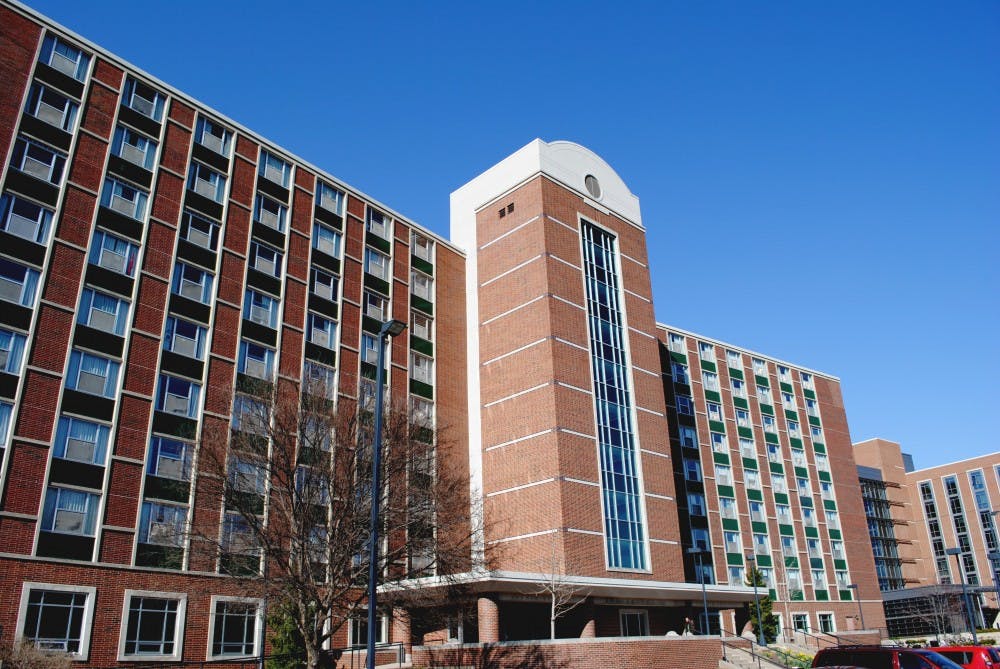Milk in Public:
What: Discussion on public breastfeeding
When: March 3, from 8 to 9 p.m.
Where: Studebaker West MPR
Although studies throughout the years have shown the benefits of breastfeeding for both the mother and the child, breast-feeding in public has become a controversial issue.
Residents of the Studebaker West Complex will be discussing this topic during an open conversation March 3 from 8-9 p.m. in the Studebaker West multipurpose room. Participants will talk about the recent controversy surrounding women who breast-feed in public.
Although the controversy seems to be based on breast-feeding, psychological science professor Kimberly Brown said it’s not — the issue is with breasts.
Brown said public breast-feeding is only controversial in the U.S.
"Breasts in the United States are considered sexual objects," she said. "Breasts in the United States are not really considered part of a woman's body under her discretion, let alone for their function of feeding babies. Breasts are seen as objects for someone else's pleasure instead of what they are: a way to feed human babies.”
Feminist for Action President Emmalie Hodge also said it’s not about the act being done in the public, it’s the way society has sexualized women.
“Our breast have become a subject of sexual objectification, [so] we often forget their actual purpose," Hodge said.
However, some people don't look at it that way, like freshman criminal justice major Morgan Dean.
"I feel like public breast-feeding makes people and myself uncomfortable when it is not discrete," Dean said. "Some women are very open when they actually need to be more private and think about their surroundings. Moms need to know when and where it is appropriate, and it's usually not in public."
Graduate student Eric Goff said he believes public breast-feeding is okay as long as it is covered.
"I just don't want to look at it, if they just flip it out," Goff said. "It is one of those things that I want some heads up, so I can turn away. I don't want to feel like I am intrusive on her body, so out of respect for her and the other people in public, the mother should cover up."
Women's and Gender Studies Instructor Cheri Ellefson said it comes down to the sexualizing of women's breasts and this has created the double standard in the way people think, which is where the issue lies.
“Many people are fine with breasts as long as they are shown so in a sexual way, like showing cleavage as long as you’re young and attractive,” Ellefson said. “But then when breasts are being used in a nonsexual, natural way by mothers, people become uncomfortable and even grossed out. When people get upset about breast-feeding, they are really just upset because people have violated a certain standard set by our society.”
Ellefson, who actually teaches about public breast-feeding, said often times students comment on covering up as a way for the mother to be modest.
“Some students will say they are okay with public breast-feeding, but out of modesty they should cover up,” Ellefson said. “What people often times don’t think about when they say that is what they are really saying which is ‘I want to police the way and determine how another woman should use her body.’”
The policing of topless women within the media has added to the conserver and made more people think this is an issue, she said.
“Breasts have become more of an issue through social media policies,” Ellefson said. “Platforms like Facebook and Instagram control how much of a breast you can show online. For a man, topless pictures with nipples will always be OK, but a topless girl will cause issues and get flagged.”
Hodge said modern media made it not okay to show topless women, even if people are trying to make it acceptable through movements like "Free the Nipple."
“When [women get shamed for showing their breasts], you start to see the women as a victim," Hodge said. "She is shamed and not to be taken seriously. With breast-feeding in particular, mothers are discouraged and degraded. We, as a society, should not make them feel bad for existing.”
Forty-nine states, as well as the District of Columbia and the Virgin Islands, have laws that specifically allow women to breast-feed in any public or private location, according to a 2015 report by the National Conference of State Legislators.
The best way to break the negative stigma is by having conversations about it, Ellefson said.
“People that are getting upset have really strict and narrow understandings about what breasts are actually supposed to do, so by talking about breasts, it helps to bring an awareness for them to understand,” Ellefson said. “The most important thing that everyone needs to understand is that it is [the mother’s] choice and it is not up to us as a society to police that decision; it’s not our job or responsibility. What we can do is support them.”
Freshman telecommunications major Cole Callahan said people tend to be uncomfortable with things they don't understand, and people think it's an issue because they think breast-feeding is explicit.
“I have no problem with breast-feeding in public because I believe it is part of nature. Many other species do it,” Callahan said. “I am an advocate of it and the #FreeTheNipple movement because, it is just another body part that all humans have.”





